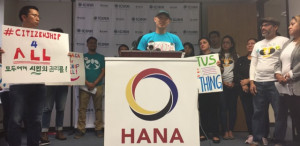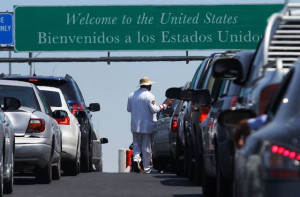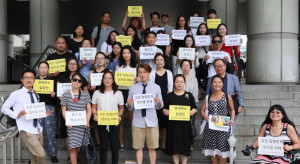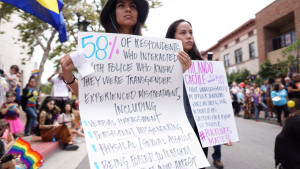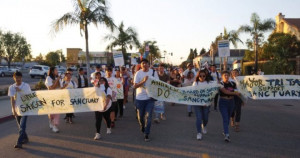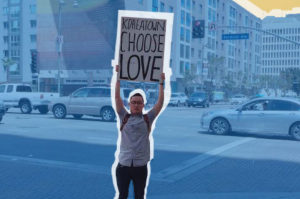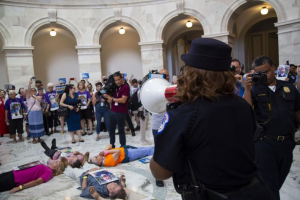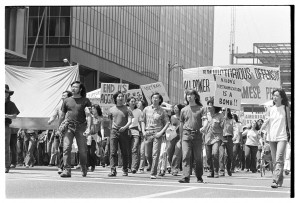On the two-year anniversary of the Trump Administration's move to terminate the Deferred Action for Childhood Arrivals program, Jung Woo Kim and other young immigrants shared stories Thursday morning about how the program helped them. “My life changed 180 degrees after I received DACA,” he said.
Media Coverage
“This rule change is a direct attack on communities of color and their families, and furthers this administration’s desire to make this country work primarily for the wealthy and White.”
The presiding judge in the Seoul Central District Court opened session Tuesday by noting the unusual audience as the small courtroom overflowed with over 60 South Korean-born international adoptees and adoptee rights advocates. The hearing was the first in a landmark lawsuit filed by deported Korean American adoptee Adam Crapser against the Korean government and Holt Children’s Services. In the US, groups such as Adoptees for Justice, KoRoot and the National Korean American Service & Education Consortium are mobilizing with the aim of passing a law retroactively granting citizenship to all adult international adoptees and allowing deportees like Crapser to return home.
Opionion piece by Vu and Huynh: In the last month, the LGBT Center OC has shown how grievously out of touch they are with the community that they seek to serve. It is disappointing that an organization self-assigned to advocate on behalf of the LGBTQ+ community chooses to erase community voices in favor of a select few on their board. On June 20th, 2019 the LGBT Center OC, also known as the Center, invited uniformed and armed police officers to march with them during the OC Pride Parade. Though Pride is a celebration of our various identities, it is ahistorical to ignore its genesis within decades-long struggles against police brutality led by trans women of color. Today, police brutality continues to enact trauma within black and brown LGBTQ+ communities. Knowing this, the Center moved forward with their decision. There was no room for discussion.
A coalition of 25 Vietnamese American, Asian American, immigrant, student, and civil rights organizations published an open letter on Monday slamming Orange County government officials for siding with the Trump administration as it challenges California’s so-called “sanctuary” law, which prohibits state and local police agencies from using their resources to enforce federal immigration law.
At the first protest against a planned shelter in Koreatown, Johnny Byul Lee was the lone counter-protester. “Oh man, my own people are showing no compassion,” he thought. “I don't want everyone to think that that's how all of us are.” He went to the first rally with a sign that read “Koreatown, Choose Love” handwritten in thick black marker — the lone counter-protester. Some protesters yelled at him in Korean. “They were really mad at me because they felt like I (had) betrayed them,” Lee said. “They also said ‘You're not really Korean because if you were then you'd understand what we're doing.”
On July 18, more than 200 people gathered outside the Capitol Building for a Catholic Day of Action for Immigrant Children. Catholic leaders and immigrant-rights activists called out the mistreatment of families as a violation of human dignity and contrary to religious teachings. After reckoning with reports of conditions in the detention camps, and a final prayer, the group moved to the Russell Senate Building rotunda to protest the administration’s immigration policies. The Lord’s Prayer and names of children who’ve died in custody filled the air. Police promptly issued warnings, then arrested 72 people for unlawful demonstration in the space. Becky Belcore, co-director of NAKASEC, advocates for the Reuniting Families Act, which would protect the family-based immigration system that is under threat of being changed to a merit-based system that prioritizes higher-educated and wealthy people.
Museums are increasingly adding social and political activism to their schedules of events. A panel at the Japanese-American museum in Little Tokyo will take a cross-generational look at the challenges and opportunities Asian American communities face as they continue to grow and engage in political action around causes including the fight against gentrification, organizing immigrant workers and other political campaigns. Eddie Wong, co-founder of Visual Communications, the first Asian Pacific American media organization in the country, will highlight the visual dimensions of protest, and will moderate a conversation with Florante Ibanez, Miya Iwataki, Sandy Maeshiro, Tiffany Do, Frances Huynh, Sophia Cheng, Jonathan Paik, and Sophia Cheng.
Earlier, we were talking about what happened after Korean American protesters shut down a plan last summer to build a shelter in Koreatown. Some worried those protests made the community look heartless. KPCC’s Josie Huang met one Koreatown resident who tried to do something about it. We’ve been talking about homelessness in Koreatown - its up 79 percent, according to the latest count. And today we look at the role of Korean churches —a big force in a diaspora that’s about two-thirds Christian. Churchgoers were among those protesting a shelter in K-Town, even though many do homeless outreach. One pastor tells KPCC’s Josie Huang there are reasons for the disconnect.
Homelessness is getting worse in Koreatown, up 79 percent over last year, homeless count data shows. City officials had planned to build a shelter there — part of a campaign to put more beds across the city, not just Skid Row. But backlash to the idea was instant. All this week, we look at what’s happened in the year since. Now we hear from the protesters who protested those who fought against the homeless shelter. KPCC’s Josie Huang reports from Koreatown.

